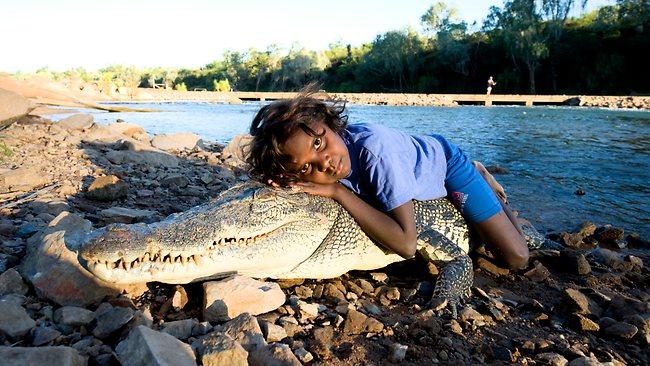Snap happy
BEAUTY and the beast in the Top End.

THE group of children taking an afternoon swim at the Daly River Crossing, south of Darwin, got out of the water sharpish when this two-metre saltwater crocodile hauled itself up onto the bank.
Then a strange thing happened: the croc promptly died in front of their eyes. The kids spent a few minutes throwing rocks at it, and poking it with sticks, just to make sure. Then nine-year-old Sahkira Miler, the youngest of the group, suddenly marched up, lay down on its back and cracked a beatific smile for Darren Clark’s camera.
“It blew me away,” the photographer says. “All the other kids were hanging back but she was just fearless. What got me was the beautiful, calm look on her face. It was really eerie.”
So what killed the croc? The local policeman, who took its body away so he could present its skeleton to the local school for educational purposes, found the smoking gun: there was a fresh cane toad in its stomach. These toxic pests, which began to infiltrate the Daly River Crossing area six years ago, have wreaked havoc on local populations of goannas, quolls and freshwater crocs. It’s rare, but not unheard of, for a saltie to come a cropper after snacking on one.
Clark was at the Daly River for a spot of R&R after spending time in the nearby community of Wudikapildiyerr, where he’d stumbled into the crossfire between two warring families and copped a lot of what he calls “reverse-racist” flak. The photographer, who’s originally from Geelong, set out in 2000 on a 10-year project to travel around the country documenting the theme of belonging and “what it means to be Australian”. Eleven years later he’s still going. (“And the longer I’ve been doing it, the more confused I’ve become,” he admits with good humour.)
Here’s another thing he can’t get his head around: half an hour after taking this picture the kids were back in the water again. “They all know people who’ve been knocked off by a crocodile but it doesn’t stop them,” he says. “I just can’t understand that mentality.”



